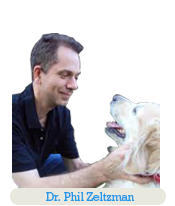
Dr. Phil Zeltzman is a mobile, board-certified surgeon in Allentown, PA. Find him online at www.DrPhilZeltzman.com. He is the co-author of “Walk a Hound, Lose a Pound” (www.WalkaHound.com).
Kelly Serfas, a Certified Veterinary Technician in Bethlehem, PA, contributed to this article.
We removed a cancerous thyroid mass in a very sweet 12 year-old Golden Retriever about 1 year ago. Let's call her Kaya. Three months later, Kaya came back for follow-up chest X-rays to make sure the tumor hadn't spread to her lungs. It hadn't, and the tumor hadn't come back in the thyroid area. So everybody is happy, right? Well, all humans involved are. But Kaya went from 60 lbs. at the time of the surgery, to 76 lbs. In other words, she gained about 25% of her body weight in 3 months. This is a huge amount. Think of the equivalent in a person - in 3 months!
How did this happen? It is very likely that the owners felt bad for Kaya's cancer and overfed her. Actually, this is a classic observation. Interestingly, the owners noticed that ever since the surgery, she has more and more difficulty getting up. The owners thought it was because of the cancer, or the anesthesia, or the surgery, or maybe arthritis. So they switched Kaya to a diet enriched in glucosamine, to help what they believed were aching joints, in addition to countless treats. And some people food, just to make sure she didn't feel neglected.
What these well-meaning owners didn't realize is that they were “killing her with love.” I believe they understand now. They had the best intentions in mind. They truly love their dog and are obviously very dedicated. But they were overfeeding her. I strongly suggested a weight-reducing diet from their referring veterinarian.
Without going into a long and boring controversy, a "light" diet from the local store is not likely to help with serious weight loss. Eventually, however, it can help maintain a healthy weight. I see the living proof of this fact daily. So for Kaya, it was no more treats, unless they were low calorie or taken from the measured amount of food she was allowed to eat that day. No more people food, unless they were small pieces of veggies such as carrots. So mostly diet dog food, and she is now slowly losing weight. I am happy to report that she is now a 1 year cancer survivor.

If we think she truly has arthritis (although, strangely, she never showed any signs before she gained the weight), we can eventually switch her back to a "joint diet" once she has reached her ideal weight. She would then also benefit from glucosamine supplements and omega 3 fatty acids (fish oil); but getting her to that ideal weight is crucial. Arthritis can wreak havoc on overweight pets, and obesity, in turn, can cause arthritis. It's a vicious cycle, and it's important to monitor your pet's weight and ability to get around (to learn how to tell if your pet is developing arthritis, check out my arthritis blog).
Statistics vary from one study to the other, but some experts believe that up to 40% of dogs are overweight or obese. This is by far the number one food-related problem vets see in daily practice. In fact, more and more doctors don't call it a "food-related problem" but an actual disease. The health consequences are numerous: increased risk under anesthesia, increased risk of cancer, diabetes, arthritis, heart disease, elevated blood pressure, breathing difficulties, heat intolerance, and an overall decreased quality of life.
The bad news? We are killing our pets with love. The good news? We can change this situation for their benefit, and our enjoyment. What benefit? What enjoyment?
One now classic scientific study showed that Labs fed a lean diet, and were at an ideal weight, lived on average 2 years longer than their overweight litter mates who ate as much as they wanted. Overweight dogs lived an average of 11 years. Lean dogs lived an average of 13 years and had fewer health concerns including less arthritis.
You can draw your own conclusions.
If you have any questions or concerns, you should always visit or call your veterinarian – they are your best resource to ensure the health and well-being of your pets.
